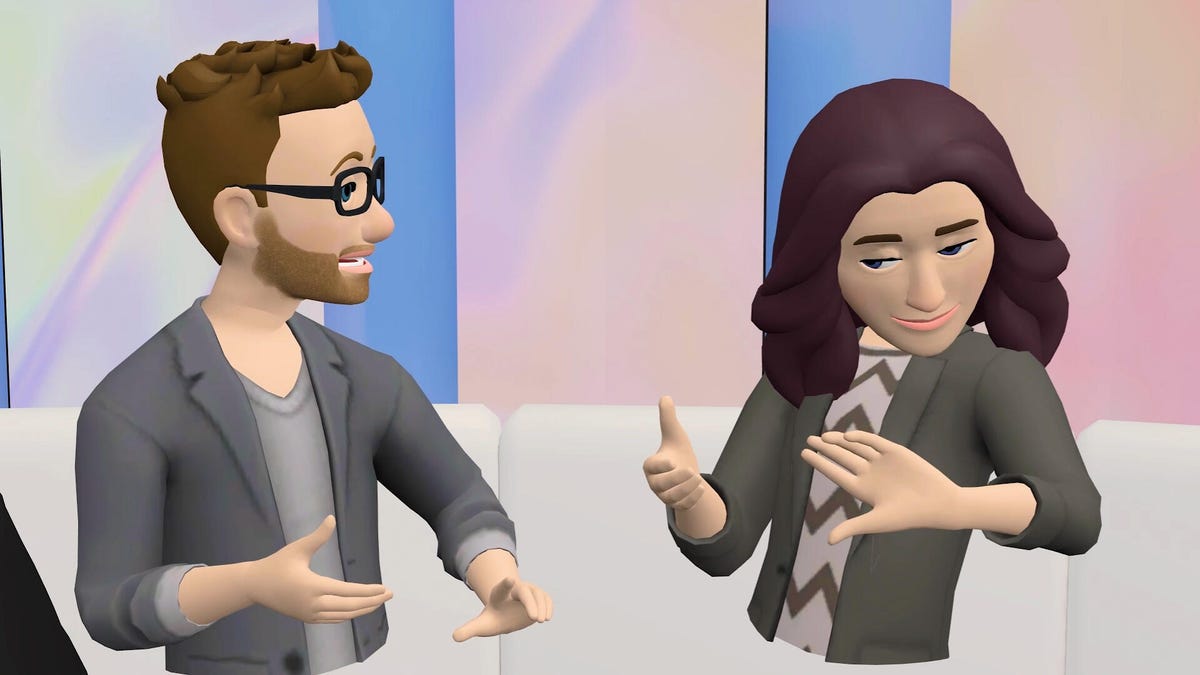Facebook adds new avatars to Oculus VR: Here's how to get one
Facebook Reality Labs' Mike Howard discusses what the avatars mean for social VR ahead of Facebook Horizon.

Facebook previewed its new Oculus VR avatars earlier this year at SXSW. They're available now.
Connecting with somebody in VR means manifesting as an avatar: like a video game persona, but for your social world. Starting Friday, April 23, Facebook's VR avatars are getting an upgrade in some apps. These changes could lay the foundation for Facebook's social VR as it readies the launch of its next social metaverse, Horizon.
The avatars were teased during a conversation I had with Oculus VR VP Mark Rabkin at SXSW this year. Facebook also used them during its closed-beta testing of Facebook Horizon, its social VR platform. The animated avatars can better react to hand movements, make estimations for body movement -- and facial expressions and mouth movement can match conversations.
Facebook's new avatars work with three updated apps on the Facebook-owned Oculus store: Pokerstars VR, Topgolf with Pro Putt and Epic Roller Coasters. The next apps to get them are SynthRiders and ForeVR Bowling.
But the biggest app that will feature the avatars will be Facebook Horizon, the company's answer to the VR metaverse. It's expected to enter public beta sometime in 2021.
The avatars matter most because VR is getting more social. As more headsets are sold -- Facebook hasn't revealed Quest 2 headset sales numbers, but they're expected to be better than most VR headsets -- more people will get together. Conversations in VR can't use video (yet), so expressive avatars are the primary way to connect and feel another person's presence.
Along with the avatars comes a new avatar-creating tool that's included in the latest V28 version of the Oculus Quest OS. Existing avatars will work with apps that don't use the new avatars, but creating a new avatar will be necessary to tap into future apps.
The customization for new avatars: lots more options, but all in human form.
According to Mike Howard, product manager for avatars at Oculus, new customizations allow more combinations of face and body types -- and more details like piercings or more unique clothing. Avatars are still all human, though. Howard says that compared to previous Oculus avatars, which were more like "pick an archetype," the new editor has roughly a quintillion combinations of face, nose, eye, hair and other customizations, plus accessories like nose rings and jewelry. "We have the option to wear a bindi," Howard says. He sees this making sure, "everyone can represent themselves really, really well."
One thing these avatars won't let you be is nonhuman. "It's not something that we are exploring at this time," Howard says. "It offers some challenges, if you think about this being a thing that developers are going to integrate, and setting good expectations with developers with developers to expect the right things from avatars, or consistently understand the avatar." Howard says that clothing options will be expanded but had no comment on possibilities of limited-edition clothes or skins, similar to what games like Fortnite offer.
Most importantly, Facebook's more expressive avatars could mean a wave of more social VR apps that tap into them: theatrical or conversational. I've used VR as a mostly solo experience, but that's starting to change. And it looks like Facebook feels strongly about it, too. "The future here is really exciting," Howard says, imagining VR as a "medium for self expression and relaying movement in a way that is increasingly more authentic, I think, and more plausible."

